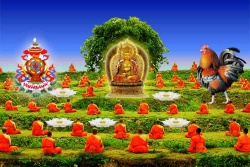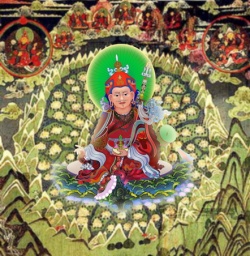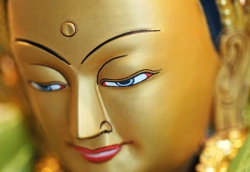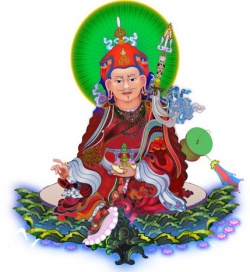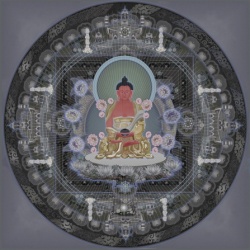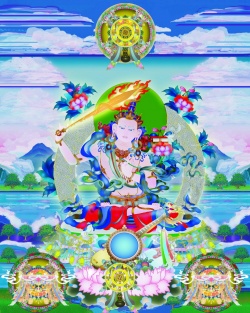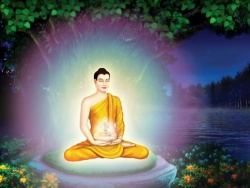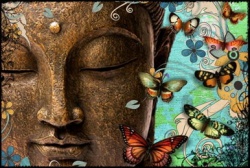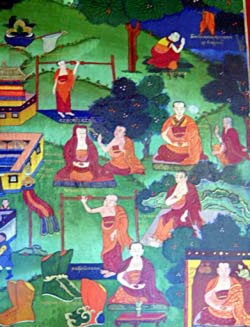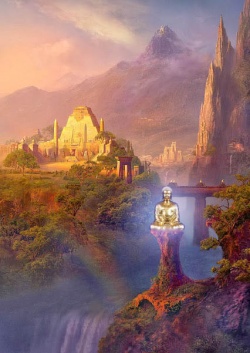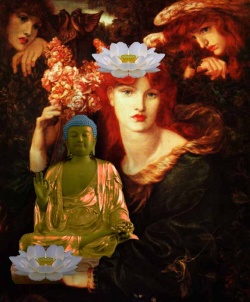Aṅguttara Nikāya - Nipāta 1-4
Written by Red Zambala
Sunday, 13 July 2014
Aṅguttara Nikāya
This Collection of Discourses, Aṅguttara Nikāya, containing 9557 short suttas is divided into eleven divisions known as nipātas.
Each nipāta is divided again into groups called vaggas which usually contain ten suttas.
The discourses are arranged in progressive numerical order, each nipāta containing suttas with items of dhamma, beginning with one item and moving up by units of one till there are eleven items of dhamma in each sutta of the last nipāta, hence the name Aṅguttara meaning “increasing by one item”.
The first nipāta, Ekaka Nipāta, provides in each sutta single items of dhamma called the Ones; the second nipāta, Duka Nipāta, contains in each sutta two items of dhamma called the ]]Twos\\,
and the last nipāta, ]]Ekādasaka Nipāta)], is made up of suttas with eleven items of dhamma in each, called the Elevens.
Aṅguttara Nikāya constitutes an important source book on Buddhist psychology and ethics, which provides an enumerated summary of all the essential features concerning the theory and practice of the Dhamma.
A unique chapter entitled Etadagga Vagga of Ekaka Nipāta enumerates the names of the foremost disciples amongst the bhikkhus, bhikkhunīs, upāsakas, upāsikās, who had achieved pre-eminence in one sphere of attainment or meritorious activity,
e.g. the Venerable Sāriputta in Intuitive Wisdom and Knowledge (Paññā); the Venerable Maha Moggallāna in supernormal powers (Iddhi);
Bhikkhunī Khema in Paññā; Bhikkhunī Uppalavaṇṇa in Iddhi; the Upāsaka Anāthapiṇḍika and the Upāsikā Visākhā in alms-giving (Dana); and so on.
(1) Ekaka Nipāta Pāḷi
This group contains single items of dhamma which form the subject matter of discourses given by the Buddha at Sāvatthi to the numerous bhikkhus residing there.
But some of the suttas were given by the Venerable Sāriputta or the Venerable Ānanda.
1. There is no one sight, sound, smell, taste and touch other than that of a woman which can captivate and distract the mind of a man;
conversely there is no one sight, sound, smell, taste and touch other than that of a man which can captivate and distract the mind of a woman. (paras 1 to 10)
2. There is no other single thing that brings about so much disadvantage and unhappiness as an undeveloped and uncultivated mind.
A developed and cultivated mind brings about benefit and happiness. (paras 28 to 31)
3. No other single thing changes so quickly as the mind. The mind is intrinsically pure and bright; it is defiled by greed, hatred and ignorance. (paras 48, 49)
4. If a bhikkhu practices the meditation of loving-kindness, and develops it even for the short duration of a finger-snap, he is regarded as following the advice of the Buddha, acting according to his instructions.
Such a bhikkhu deserves to eat the alms-food offered by the people. (paras 53, 54)
5. There is only one person whose appearance in the world brings welfare and happiness to the many, brings benefit, welfare and happiness to devas and men. It is a Tathagata, a fully Enlightened Buddha.
It is impossible for two Enlightened Buddhas to appear simultaneously in the same world system. (paras 170 to 174)
6. It is impossible for a person possessed of right views, i.e. a Sotāpanna, to regard any conditioned formation as permanent, happiness, Self (nicca, sukha, atta).
It is possible only for an uninstructed worldling to regard anything as permanent, happiness, Self, (paras 268 to 270)
7. If one thing is developed and frequently practiced, the body is calmed, the mind is calmed, discursive thinking is stilled, ignorance is shed, knowledge arises, delusion of self is eliminated, evil tendencies are eradicated, the fetters are removed.
That one thing is the mindful contemplation of the body. (paras 571 to 576)
(2) Duka Nipāta Pāḷi
1. There are two things to be borne in mind: not to be content with what has been achieved in the process of development, i.e. even with the attainment of jhānas or inner lights (which indicates a certain stage of Insight meditation),
and to resolve to struggle unremittingly and strenuously until realization of the goal, the enlightenment. (para 5)
2. There are two potentialities of men, to do good or to do evil. It is possible to abandon evil; abandoning of evil brings benefit, and happiness.
It is also possible to cultivate the good. Cultivation of the good brings benefit and happiness too. (para 19)
3. Two things are conducive to attainment of liberation in two ways: Concentration Meditation and Insight Meditation.
If concentration is developed, the mind becomes developed and passion fades away resulting in liberation of mind.
If insight is developed, wisdom is developed and ignorance fades away resulting in liberation by knowledge. (para 32)
4. There are two persons one can never repay: mother and father.
Even if one should live a hundred years during which one attends upon ones mother and father, heaps all ones attention, love and personal service on them, one can never repay them for having, brought up, fed and guided one through this life.
But if a person causes his parents who are non-believers to become established in the faith and to take refuge in the Buddha, the Dhamma and the Sangha;
if he causes his parents who do not observe the precepts to become established in morality; if he causes his miserly parents to become generous so that they come to share their wealth with the poor and the needy;
if he causes his ignorant parents to become established in the knowledge of the Four Truths,
then such a person repays and more than repays his parents for what they have done for him. (paras 33, 34)
5. There are two kinds of happiness: The happiness of the home life and the happiness of homelessness; the happiness of homelessness is superior.
The happiness of the senses and the happiness of renunciation; the happiness of renunciation is superior.
Tainted happiness and untainted happiness; Carnal and non- carnal happiness; and ignoble and noble happiness; Bodily and mental happiness; mental happiness is superior. (paras 65 to 71)
(3) Tika Nipāta Pāḷi
1. The fool can be known by three things, by his conduct in deed, word and thought; so also the wise man can be known by three things, by his conduct in deed, word and thought. (para 3)
2. There are three places a sovereign king should not forget: his birth place, the place where he was crowned as king and the site of battle in which he conquered his enemies.
There are three places a bhikkhu should not forget: the place of renunciation, the place where he achieved the knowledge of the Four Noble Truths and the place where he attained Arahatship. (para 12)
3. He who devotes himself earnestly to his business in the morning, in the daytime and in the evening, will prosper, and grow in wealth;
the bhikkhu who devotes himself earnestly to development of concentration in the morning, in the daytime and in the evening will progress and gain advancement in his spiritual work. (para 19)
4. These three types of persons are found in the world: One with a mind like an open sore; one with a mind like a flash of lightning; one with a mind like a diamond.
One who is irascible and very irritable, displaying anger, hatred and sulkiness; such a one is said to be a person with a mind like an open sore.
One who understands the Four Noble Truths correctly is said to have a mind like a flash of lightning.
One who has destroyed the mind- intoxicating defilements and realized the liberation of mind and the liberation by knowledge is said to have a mind like a diamond. (para 25)
5. There are these three kinds of individuals in the world: One who speaks words reeking with foul smell; one who speaks words of fragrance; and one who speaks words sweet as honey. (para 28)
6. There are three root causes for the origination of actions (kamma): greed, hatred and ignorance.
An action done in greed, hatred and ignorance will ripen wherever the individual is reborn;
and wherever the action ripens, there the individual reaps the fruit (vipaka) of that action, be it in this life, in the next life or in future existences. (para 38)
7. He who prevents another from giving alms hinders and obstructs three persons:
He causes obstruction to the meritorious act of the donor; he obstructs the recipient in getting his gift; he undermines and harms his own character. (para 58)
8. Three dangers from which a mother cannot shield her son nor the son his mother: Old age, disease and death. (para 63)
9. The well-known sutta, Kesamutti Sutta also known as Kālāma Sutta, appears as the fifth sutta in the Mahāvagga of the Tika Nipāta.
At Kesamutta, a small town in the Kingdom of Kosala, the Buddha thus exhorted the Kālāmas, the inhabitants of the town:
"Do not be led by reports or traditions, or hearsay.
Do not be led by the authority of religious texts, nor by mere logic or inference, nor by considering appearances, nor by speculative opinion, nor by seeming possibilities, nor because ones own teacher has said so.
O Kālāmas, when you know for yourselves that certain things are wrong, unwholesome, bad, then give them up; when you know for yourselves that certain things are right, wholesome, good, then accept them, follow them." (para 66)
10. A bhikkhu devoted to the holy life should pay equal attention to three factors in turn, namely: concentration, energetic effort and equanimity, and not exclusively to one of these factors only.
If he gives regular attention to each of them, his mind will become soft, pliant, malleable, lucid and well concentrated, ready to be directed to whatever mental states are realizable by supernormal knowledge. (para 103)
11. There are three rare persons in the world:
- a Tathagata who is a perfectly Enlightened One is rare in the world;
- a person who can expound the Teaching and Discipline as taught by the Buddha is rare in this world;
- and a person who is grateful and thankful is rare in the world. (para 115)
12. Whether a Tathagata appears in the world or not, the fact remains as a firm and inevitable condition of existence
that all conditioned formations are impermanent, that all conditioned formations are subject to suffering, that all things are devoid of self, (para 137)
(4) Catukka Nipāta Pāḷi
1. These four persons are found in the world:
I. he who goes with the stream;
II. he who goes against the stream;
III. he who stands firm;
IV. he who has crossed over to the other shore and stands on dry land.
The person who indulges in sense desires and commits wrong deeds is one who goes with the stream.
He who does not indulge in sense desires or commit wrong deeds, but lives the pure, chaste life, struggling painfully and with difficulty to do so is one who goes against the stream.
He who stands firm is the person who, having destroyed the five lower fetters, is reborn spontaneously in Brahma realm, whence he realizes Nibbāna without ever returning to the sensuous sphere.
The one who has gone to the other shore standing on dry land is the person who has destroy¬ed all the mental intoxicants, and who has realized, in this very life, by himself, the liberation of the mind and liberation by knowledge. (para 5)
2. There are four right efforts:
I. The energetic effort to prevent evil, unwholesome states of mind from arising;
II. the energetic effort to get rid of evil, unwholesome states of mind that heave already arisen;
III. the energetic effort to arouse good, wholesome states of mind that have not yet arisen;
IV. the energetic effort to develop and bring to perfection the good and wholesome states of mind already arisen. (para 13)
3. As a Tathagata speaks, so he acts; as he acts, so he speaks. Therefore he is called a Tathagata. (para 23)
4. There are four highest kinds of faith:
I. The Tathagata, the holiest and fully enlightened, is the highest among all living beings.
II. Among all conditioned things, the Noble Path of Eight Constituents is the highest.
III. Among all conditioned and unconditioned things, Nibbāna is the highest.
IV. Amongst all groups of men, the Order of the Tathagata, the Sangha made up of the four pairs of noble men, the eight Ariyas, is the highest.
For those who have faith in the highest, namely, the Buddha, the Path, the Nibbāna and the Ariyas the highest resultant effects (result of action) will be theirs. (para 34)
5. There are four ways of dealing with questions:
I. Some should be given direct answers,
II. others should be answered by way of analyzing them,
III. some questions should be answered by counter-questions,
IV. lastly, some questions should simply be put aside. (para 42)
6. There are four distortions (vipallāsas) in perception, thought and view:
I. To hold that there is permanence in the impermanence;
II. to hold that there is happiness in suffering;
III. to hold that there is atta where there is no atta;
IV. to hold that there is pleasantness (subha) in that which is foul. (para 49)
7. When Nakulapitā and Nakulamātā express their wish to the Buddha to be in one another's sight as long as the present life lasts and in the future life as well,
the Buddha advises them to try to have the same faith, the same virtue, the same generosity and the same wisdom; then they will have their wish fulfilled. (paras 55-56)
8. He who gives food gives four things to those who receive it:
He gives them long life, beauty, happiness and strength.
The donor himself will be endowed with long life, beauty, happiness and strength wherever he is born in the human or the deva world. (para 57)
9. There are four subjects not fit for speculative thought (Acinteyyāni). They are:
I. the specific qualities of a Buddha (Buddhavisayo);
II. a person's jhāna attainment;
III. the results of Kamma; and
IV. the nature of the world (loka cintā).
These imponderables are not to be pondered upon; which, if pondered upon, would lead one to mental distress and insanity. (para 77)
10. There are four things concerning which no one whether samaṇa, brāhmaṇa, deva, Mara or anyone else in the world can give a guarantee:
I. That what is liable to decay should not decay;
II. that what is liable to illness should not fall ill;
III. that what is liable to die should not die; and
IV. that no resultant effects should come forth from those evil deeds done previously. (para 182)
11. There are four ways by which a persons character may be judged:
I. His virtue can be known by a wise and intelligent person paying close attention after living together with him for a very long time.
II. His integrity can be known by a wise and intelligent person by having dealings with him, paying close attention over a long period of time.
III. His fortitude can be known by a wise and intelligent person by observing him with close attention in times of misfortune.
IV. His wisdom can be judged by a wise and intelligent person when conversing with him on various subjects over a long period of time. (para 192)
12. There are four things conducive to the growth of wisdom:
I. associating with a good person;
II. hearing the good Dhamma;
III. maintaining a right attitude of mind and
IV. leading a life in accordance with the Dhamma. (para 248)
